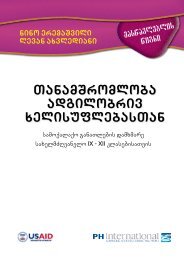The Geneva Protocol, by David Hunter Miller
The Geneva Protocol, by David Hunter Miller
The Geneva Protocol, by David Hunter Miller
Create successful ePaper yourself
Turn your PDF publications into a flip-book with our unique Google optimized e-Paper software.
CHAPTER VII. 27<br />
shall not be changed as a result of aggression. Indeed, the <strong>Protocol</strong>[9] protects even an aggressor against loss<br />
of territory or of independence as a penalty for its aggression; discussion, leading up perhaps to peaceful<br />
agreement but to nothing else, is permitted <strong>by</strong> Articles 11 and 19 of the Covenant, but that is all.<br />
{36}<br />
My view is that these provisions are sound and that they should not be extended.<br />
In saying, as I did, that the possibility of change in the status quo is along only two lines, the line of<br />
agreement and the line of war, I did not lose sight of the proposals made in various forms that there should be<br />
some method under the League of Nations or otherwise <strong>by</strong> which a tribunal of some sort would be empowered<br />
to make such changes from time to time. Most of these proposals envisage plebiscites in one form or another.<br />
<strong>The</strong>se proposals <strong>by</strong> their advocates are thought to have the advantage of adaptability to changing conditions<br />
and to be more conformable to the theory of the consent of the governed as a basis of Government.[10]<br />
Of course, changes of frontiers made <strong>by</strong> any form of tribunal would in a sense be changes of frontiers made<br />
<strong>by</strong> agreement among the parties; for there would be necessarily an agreement in advance setting up such a<br />
tribunal and engaging to conform to its conclusions.<br />
It may perhaps be imagined that as between two particular countries some such arrangement is possible along<br />
limited lines and relating to a particular area or areas. I doubt even this possibility; but certainly no general<br />
agreement in accord with such theories is possible and in my judgment it would be highly undesirable if it<br />
were possible.<br />
A tribunal which was charged with the duty of determining changes in frontiers would clearly be a superstate,<br />
full-fledged, and in any sense of that much abused term. Obviously, a change of frontier, if it went far enough,<br />
might result in the substantial, or even the literal, disappearance of one state <strong>by</strong> its incorporation within the<br />
territories of another. It is inconceivable that any country would agree to such a proposition. Even if it were<br />
limited very strictly, it would present enormous difficulties and would certainly arouse fierce passions, as is<br />
well illustrated <strong>by</strong> {37} discussion regarding the tribunal which is now sitting to consider the frontier between<br />
Northern and Southern Ireland.<br />
Nor would the matter be resolved <strong>by</strong> the suggested idea of plebiscites. Anyone who will consider this question<br />
of plebiscites will realize that the determining factor is not wholly the vote itself but to a large extent the terms<br />
in which the plebiscite paper is written. He who drafts the agreement for the plebiscite has much to do with<br />
what the plebiscite will determine.[11] <strong>The</strong> questions are: Is the area to vote as a whole or <strong>by</strong> districts, and<br />
where is the line of the voting area to be drawn? <strong>The</strong> first of these was one of the great questions in the Upper<br />
Silesia case. To apply the idea to an existing episode, let us again refer to the case of Ireland. If the plebiscite<br />
were in the whole of Ireland, it would go for Dublin; if it were in Ulster, it would go for Belfast; if it were in<br />
Tyrone or Fermanagh, the result would perhaps depend on the exact date when it was taken, as recent<br />
elections indicate.<br />
Another difficulty about plebiscites is this: Is their effect perpetual or not, and if not how long does it last? If<br />
Tyrone votes for Dublin today, is it an eternal decision or only till another vote in 1930, or till when? <strong>The</strong>re<br />
must be some time limit at least; plebiscites cannot be held every year or even every five years, a fact which<br />
illustrates the quiet advantages of some kind of a status quo.<br />
Another question about a plebiscite is this: Let us concede that an overwhelming vote such as took place in<br />
the regions of East Prussia under the Peace Treaties is to be decisive forever. But suppose the vote is very<br />
close; how about a vote where a little over half of the population go one way and a trifle under half go the<br />
other? Is this conclusive? Does it have the same moral effect as a larger vote? Is a majority of one vote just as
















